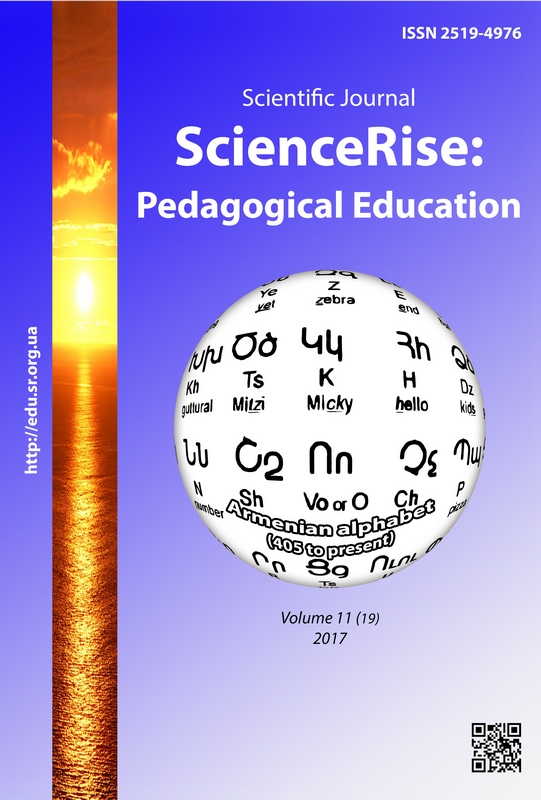Education in the area of intellectual property as a condition of the stable state development
DOI:
https://doi.org/10.15587/2519-4984.2017.116197Keywords:
intellectual property, education, manager of intellectual property, engineer-patents, competence, innovationAbstract
There was established a necessity to increase the role of intellectual property (IP) as a motive force of the economy, based on knowledge. It was elucidated, that Ukraine has rather high rating level at the market of intellectual goods and services by the intellectual and educational potential, but the state urgently needs a training of high-qualified specialists in IP field, able to favor realization of tasks, inherent to modernity, especially, further formation of the intellectual property market, increase of competitiveness of enterprises, protection of individual author results. There was ascertained the imbalance between specialists’ training in the aforesaid field and demands of the labor market, solution of problems of the choice of forms of protection and commercialization of objects of intellectual property, introduction of modern innovation activity management technologies, adequate to modern conditions.
There was formulated the author view on the list of key competences, must be acquired by MA graduates in the sphere of intellectual property, substantiation of a necessity of further popularization of knowledge on IP problems, harmonization of the system “education-science-production-market”. There were determined the ways of solving problems, connected with creation and effective use of intellectual property in all spheres of social activity
References
- Butnik-Siverskyi, O. B., Havrylenko, O. P., Dovhyi, S. O. et. al.; Butnik-Siverskyi, O. B., Sviatotskyi, O. D. (Eds.) (1999). Otsinka intelektualnoi vlasnosti. Bukhhalterskyi oblik ta opodatkuvannia [Evaluation of intellectual property. Accounting and taxation]. Kyiv: Vydavnychyi Dim “In-Yure”, 352.
- Denysenko, M. P., Hrechan, A. P., Haman, M. V. et. al.; Denysenko, M. P. (Ed.) (2008). Provayding innovaciy [Providing of innovation]. Kyiv: Vydavnychyi Dim “Professional”, 448.
- Neghiborec, V. (2007). Innovatsiina infrastruktura: problemy, perspektyvy, rishennia [Innovative Infrastructure: Problems, Prospects, Solutions]. Theory and practice of intellectual property, 5, 60–69.
- Fedulova, L. I. (2006). Stratehiia upravlinnia intelektualnoiu vlasnistiu v umovakh innovatsiinoi ekonomiky [Strategy of intellectual property management in conditions of innovative economy]. Personnel, 11, 72–80.
- Chuhno, A. (2002). Intelektualnyi kapital: sutnist, formy i zakonomirnosti rozvytku [Intellectual capital: the essence, forms and patterns of development]. Ukraine economy, 11, 155.
- SSHA ostayutsya liderom po chislu mezhdunarodnykh zayavok na patenty i tovarnye znaki [The United States remains the leader in the number of international applications for patents and trademarks]. Vsemirnaya organizatsiy intellektual'noy sobstvennosti. Available at: http://www.wipo.int/pressroom/ru/articles/2016/article_0002.html
- National Crime Prevention Council. Available at: http://www.ncpc.org/
- Center for Humanitarian Technologies. Available at: http://gtmarket.ru/ratings/education-index/education-index-info
- Lazariev, M. I., Lunyachek, V. E., Ruban, N. P., Timanjuk, V. M., Fesenko, N. S., Chernenko, Yu. Yu. (2017). Upravlinnya pidgotovkoju fahivciv u sferi intelektual’noji vlasnosti: transformacii na suchasnomu etapi [Management of training specialists in the field of intellectual property: transformations at the present stage]. Actual problems of public administration, 1 (51). Available at: http://www.kbuapa.kharkov.ua/e-book/apdu/2017-1/doc/5/01.pdf
- Lunyachek, V. E., Ruban, N. P., Rubashka, V. P., Timanjuk, V. M., Fesenko, N. S. (2017). Kompetentnisna model’ vypusknika magistratury – fahivcja v sfery intelektual’noi vlasnosti [Competent model of a graduate of a magistracy – a specialist in the field of intellectual property]. Problems of engineering pedagogic education, 54-55, 54–67.
- Lunyachek, V. E. (2016). Problemy upravlinnia profesiynoiu pidgotovkoiu fahivciv v umovah magistratury [Problems of management of professional training of specialists in the conditions of a magistracy]. Problems of engineering pedagogic education, 50-51, 26–32.
- Timanjuk, V. N. (2013). Intellektual'naya sobstvennost' kak sredstvo formirovaniya professional'no-spetsializirovannykh kompetentsiy inzhenerov-pedagogov [Intellectual property as a means of forming professional-specialized competencies of engineer-educators]. Problems of engineering pedagogic education, 40-41, 97–103.
- Timanjuk, V. M., Timanjuk, I. V. (2014). Suchasni vymohy do profesionalu v sferi intelektualnoi vlasnosti [Modern requirements for a professional in the field of intellectual property]. Young scientist, 1, 186–189.
- Teaching of Law of Intellectual Property (IP) in Transition Economy Countries. Available at: http://www.wipo.int/publications/en/details.jsp?id=4115&plang=RU
- Intellectual Property Indicators 2016 (2016). WIPO, 171. Available at: http://www.wipo.int/edocs/pubdocs/en/wipo_pub_941_2016.pdf
- Intellectual Property and Education in Europe. Study on IP Education in school curricula in the EU Member States with additional international comparisons (2015). Office of Harmonization in the Internal Market, 211. Available at: https://euipo.europa.eu/ohimportal/documents/11370/80606/IP+and+Education+final+report+September+2015 doi: 10.2814/165598
- Legal IT Club. Available at: http://legal-it.club/
Downloads
Published
How to Cite
Issue
Section
License
Copyright (c) 2017 Vadim Lunyachek, Nataliya Ruban, Valeriya Timanjuk, Nataliya Fesenko, Yuliya Chernenko

This work is licensed under a Creative Commons Attribution 4.0 International License.
Our journal abides by the Creative Commons CC BY copyright rights and permissions for open access journals.
Authors, who are published in this journal, agree to the following conditions:
1. The authors reserve the right to authorship of the work and pass the first publication right of this work to the journal under the terms of a Creative Commons CC BY, which allows others to freely distribute the published research with the obligatory reference to the authors of the original work and the first publication of the work in this journal.
2. The authors have the right to conclude separate supplement agreements that relate to non-exclusive work distribution in the form in which it has been published by the journal (for example, to upload the work to the online storage of the journal or publish it as part of a monograph), provided that the reference to the first publication of the work in this journal is included.







